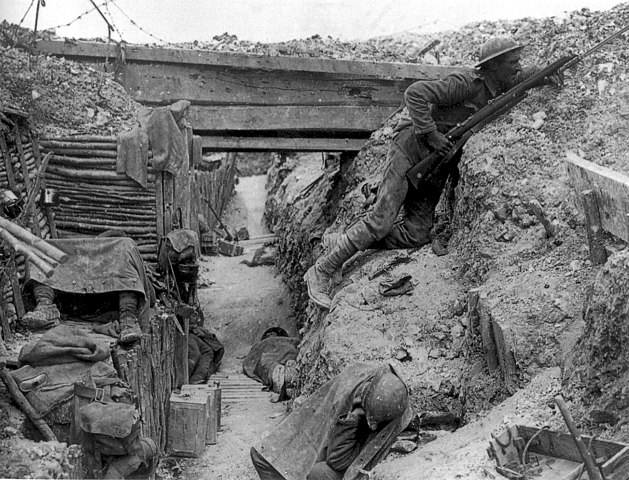Some Old Favorites About World War I

“Cheshire Regiment trench Somme 1916” by John Warwick Brooke – This is photograph Q 3990 from the collections of the Imperial War Museums (collection no. 1900-13).
Recently I shared some of the most interesting new books about World War I that have landed in my mailbox.* Wonderful though many of the new books are, it would be a shame to forget the many excellent older books available.
Here are some of my favorites:
Paul Fussell’s The Great War and Modern Memory (1975) is a rich discussion of the intersection between World War I (specifically the British experience on the Western Front)and literature: both the literature that came out of the trenches and subsequent attempts to remember and mythologize the war.
Robert Graves’s Goodbye to All That (1929 or 1957–the two editions are very different) is one of the classic memoirs of the war–a bitter, unsentimental and darkly comic farewell to pre-war England. (On opening Fussell at random, I see that he describes Goodbye to All That as the “stagiest” of the war memoirs. Read it for yourself and tell me what you think.) Depending on where you hang out, you may know Graves as the author of The White Goddess, a poetic study of European myth and/or as the author of the popular novel I, Claudius, which the BBC turned into an equally popular television series in 1976. Personally, I found The White Goddess unreadable and only watched one episode of I, Claudius.** But I was totally absorbed by Goodbye to All That. Graves does not simply paint a picture of his experience of the trenches. He sets that experience within the larger context of his life before and after the war, showing what members of a particular class and caste lost in the war. Reading Graves, the phrase “the lost generation” takes on richer meaning.
Samuel Hynes’s A War Imagined: The First World War and English Culture (1990) looks at what he calls the “Myth of the War”, which he describes “not as a falsification of reality, but an imaginative version of it, the story of the war that has evolved and has come to be accepted as true.” In many ways a pendant to Fussell’s work, A War Imagined considers the construction of the war by contemporary artists and writers–both officially and unofficially–and the post-war construction of monuments and anti-monuments. This kind of thing is intellectual meat and drink to me.
Last, but definitely not least, Barbara Tuchman’s The Guns of August (1962) remains the standard against which I measure popular history. If I could only have one book about World War I on my shelf, it would be this one.*** Writing with transparent, often witty, prose and an eye for the telling detail, she takes a familiar story–the first month of World War I–and makes it into a page-turner. Hmm, I think I know what I’m taking to read on the road in September.
Looking at this list, I realize that it is Anglo-centric, with a Western front bias–a reflection of my academic roots in British imperialism. Can you help me shake that up a little?
*One of the side benefits of writing History in the Margins is that publishers send me review copies of books. My basic policy on this is that I only review them if I honestly think they are good. On the other hand, just because I didn’t review something I received doesn’t mean it’s not good: I simply may have gotten to it yet. Time is short and the To-Be-Read shelves bulge with choices.
**Though on later reflection, the soap opera qualities that put me off were in fact a pretty realistic depiction of Roman dynastic politics at the time. I wonder how many classicists write for the soaps?
***Though Peter Englund’s The Beauty and the Sorrow would come a close second.





Pamela,
Another informative post. I’m not familiar with Englund’s work, but I soon will be. Another book I’ve enjoyed on the topic is “A World Undone” by G.J. Meyer.
Bart
Adding A World Undone to my own list.